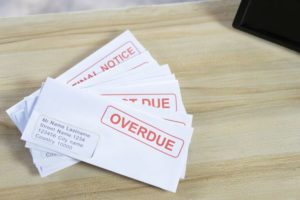Content Reviewed by:
Dave Gormley •
May.7.2023
Vertified Content
May 7, 2023
| Read Time: 5 minutes
Hackers, skimmers, and data thieves are a part of modern life. As a result, identity theft is a very real problem that could happen to any of us. There are a million articles out there advising you how to avoid this painful experience. You should read them and take their advice.
However, what do you do if it does happen to you? This post will give you a step by step plan for dealing with identity theft. Nobody can make this a painless experience. But if you work fast, and follow our plan, you can make the pain go away as soon as possible.
This is a two-part blog post. The first post (this one) tells you what to do immediately. The first 5 things you do simply stop the bleeding. After that, you still have to repair and recover your credit. Learn more about Rebuilding Your Credit.
Do these first 5 steps as quickly as you can.
Do not delay or the damage is going to be greater. The other steps involve recovering and repairing your credit. You can do them after you decompress from the first 5 steps. Just don’t wait too long.
Article Contents
Types of Fraud and Identity Theft
There are two types of identity fraud. One is where the thief uses your credit or debit card to purchase products. You may not find out until you get your statement.
The other (and worse) sort of identity fraud is when a thief opens new accounts in your name. You may not find out about this for quite some time as the statements for the new accounts will not be coming to you.
The action plan in this post applies regardless of which type of identity theft you have suffered.
The Immediate Steps – Stop the Bleeding
Here is a list of steps you should take immediately.
Step 1 – Start a Call Log
Write down the exact date and time you made each call, who you talked to, and what they told you. This may prove invaluable if somebody on the other end does not follow through with their duties. You want to be able to prove you did report everything in a timely manner.
Step 2 – Call Your Financial Institutions
First, call the financial institution you know is involved. Call your bank, your credit card issuer, or other financial organization with which you have an account. Ask to speak to their fraud department. Report your identity was stolen, and tell them you did not make the charges in dispute. Tell them to close or freeze the account so nobody can use it again.
You may need to close a bank account and open a new one. If so, make sure you redirect any automatic deposits or bill payments. You don’t want to miss paying a bill, or have a paycheck delayed. Your life will be stressful enough without those added problems.
Change any logins, passwords, and PINS for all of your accounts, or for any new account you open up in response to the fraud. Don’t reuse the same old password you love. Assume it is compromised.
Step 3 – Contact the Credit Agencies
Contact the big 3 credit reporting agencies. Their contact information is below. Ask them to put a fraud alert on your credit. This last for 90 days. If you call one of these agencies, they are supposed to notify the other two. Don’t rely on that. We suggest you contact all three.
A fraud alert will protect your credit by forcing any business to verify your identity before extending credit. This will also make it a lot easier to have fraudulent transactions removed from your credit if they do appear.
Request a free copy of your credit report as you are a victim of fraud. They must send you one as a victim of fraud. Examine it very carefully and find each and every fraudulent account, credit inquiry, and any other erroneous information.
Equifax – www.equifax.com
(800) 525-6285
PO Box 740250, Atlanta, GA 30374-0241
Experian – www.experian.com
(888) 397-3742
PO Box 2002, Allen, TX, 75013
TransUnion – www.transunion.com
(800) 680-7289
PO Box 6790, Fullerton, CA 92834-6790.
Step 4 – Report Identity Theft to the Federal Trade Commission
This is the federal governmental agency in charge of identity theft issues. They have an online reporting system. You are not necessarily doing this to help catch the bad guys. You are doing this so the credit agencies, banks, and credit card issuers believe your claim of identity theft. These businesses get scammed all the time. They may not believe you when you swear you didn’t buy that jewelry or new car. If you file an official report with the proper government agencies, they will believe you and you will be treated differently.
File a report with the Federal Trade Commission (FTC) online or call 1-877-438-4338. If filing online, you’ll complete a form which generates a report you can take to businesses to prove your identity was indeed stolen, and you aren’t just covering up some bad decisions.
Step 5 – File a Police Report
You do this for the same reason as the report to the FTC. If a business doesn’t believe you with an FTC report, they definitely will if you have a local police report. That is because filing a false report is a crime, and no sane person would do that.
Call the police, but you may have to go to the station. Provide them with a copy of the FTC report, your photo ID, and any proof you have that your identity was stolen.
Get a copy of the police report to you can use that along with the FTC report when dealing with businesses to recover your identity. If they seem reluctant to take the report, provide them a copy of the FTC Memo to Law Enforcement.
Next Steps
This isn’t the end of the process. This is just the end of the steps you have to take as soon as possible. You still have to go through the process of recovering and repairing your credit. See our separate post explaining those steps here.
We hope identity theft never happens to you. But if it does, we hope this post helps you recover as quickly as possible.
Want to know more? Discover what you need to know about Maryland law. Click here to see our Free Legal Consumer Guides and get answers to your questions today. Know your options. Be informed. Protect yourself.
Need an attorney? Please contact us for a consultation today if you need an experienced lawyer in Waldorf and Lexington Park for your legal case.
Like our blog? Subscribe to our email newsletter and stay informed!









